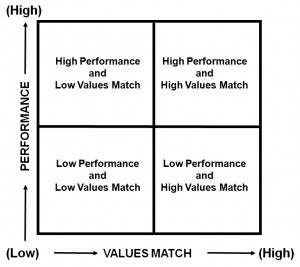I attended a luncheon a couple of weeks ago where Jack and Suzy Welch spoke about their new book, The Real Life MBA. While I don’t agree with everything Jack did in his “Neutron Jack” days, he has to be held up as a pioneer in the connection between culture and performance. In fact, he’s recognized as the first corporate CEO to hold leaders accountable for both performance and values. He accomplished this by evaluating all GE leaders and managers according to his “Values Performance Matrix.”
I’ve used this illustration many times when speaking about culture. The model is a simple X-Y graph with the vertical axis representing PERFORMANCE and the horizontal axis representing the VALUES MATCH. The quadrants represent the four possible combinations of high or low performance and high or low values match.
- The stars in any company have high performance and share the values of the company. They are the keepers.
- The second type of employee has low performance but shares the company’s values. With training and development they have the potential to become future stars.
- The third type of employee has low performance and doesn’t share the values and should be helped out of the company.
- The fourth type of employee is the most difficult to deal with. They deliver on the numbers but don’t share the company’s values. They might be the tyrant in sales or the autocratic department head. Jack refers to them as “terrorists” because if they are allowed to stay they do tremendous damage.
If people who don’t share the organization’s core values are allowed to remain, regardless of how great they perform, then it’s impossible to create a culture of accountability where core values are the standard to which everyone is evaluated.
The Real Life MBA defines leadership as “the relentless pursuit of truth and the ceaseless creation of trust.” If even one leader or highly visible individual contributor is allowed to operate outside of the organization’s values then over time trust will be broken down and organizational integrity will be doubted. The murmur may start small but like cancer, if it isn’t treated, it will surely grow. Consider using the Values Performance Matrix to see where people in your company fit. I can attest, and I’m sure I’m not alone, to how difficult it is to sustain growth when truth and trust don’t exist. Let’s make a pact, never again, never again!



